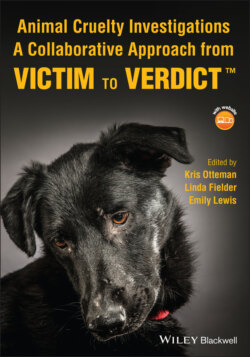Читать книгу Animal Cruelty Investigations - Группа авторов - Страница 115
2.5.4 Canine (Domestic Dogs)
ОглавлениеDogs' relationships with people vary tremendously from being kept as indoor companions, as outdoor guardians protecting livestock or property, or kept strictly outdoors, sometimes chained or fenced in, with little human contact. Some states prohibit chaining dogs (often with certain exceptions), while chaining is allowed in others. Chains and collars must fit appropriately and not cause wounds or be so tight as to damage or become embedded in the skin (Figure 2.3). Dogs require an area clear of environmental hazards, access to potable water, and shelter that provides protection from extreme temperatures and allows them to stay dry and away from their feces and urine. Dogs are omnivores whose nutritional requirements are based on size, age, and activity level. They can develop viral diseases and parasite infections, some of which are zoonotic (contagious to humans), such as rabies and hookworms. Vaccination and deworming prevent these conditions from debilitating or killing dogs and protects humans from infection. Breeds with particular hair coats require grooming to prevent matting, which can become painful, interfere with mobility, and contribute to skin infection and disease. Dogs, especially seniors, require regular nail trimming to keep their nails from curling and becoming embedded in their paw pads. Routine dental care is required for most dogs, especially as they age. Painful dental disease later in life, requiring veterinary care, can become a serious health concern in the canine.
